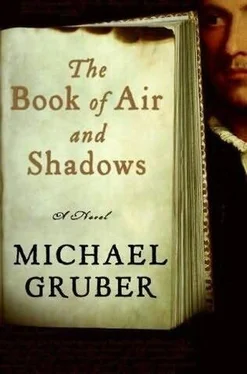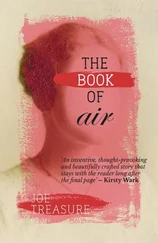“The cops were Murray and Fernandez?”
He stared at me, his smile gone. “Yeah, how did you know?”
“They came to see me, to see if I could shed light.”
“Why would they do that?”
“Because he was my client. He came to me with some story about a manuscript he’d turned up. I assumed that you sent him.”
Mickey gaped at me. Paul appeared and laid down our Jewish artichokes. When we were alone again, Mickey leaned toward me and, with lowered voice, said, “I didn’t send him. No, wait a second-he did ask me once if I knew an intellectual property lawyer and I said my best friend was one, and mentioned your name. I asked him why he was interested and he told me he’d come across some manuscripts that might be publishable and wanted to know their status under law. And he actually came to see you?”
“Yes,” I said. “He told me he had a manuscript that revealed the whereabouts of an unknown Shakespeare manuscript…” I was beginning to relate what I had told Bulstrode when Mickey swallowed a half of an artichoke heart and coughed violently and had to wash it down with San Pellegrino before he could speak.
“No, no, he had a manuscript that mentioned Shakespeare. Or so he claimed. I never saw the thing myself. Because of what happened with Pascoe, he was more than a little paranoid. He made a trip to England about that time-it was last summer-and when he came back he was, I don’t know, not himself. Nervous. Irritable. He refused to talk about what he had, except that it was a completely unknown mention of William Shakespeare in a genuine contemporary manuscript. He didn’t tell me where he’d found it, by the way. I bet that’s some story!”
“You mean somebody just mentioning Shakespeare in a manuscript, that would make it valuable per se?”
He stopped mopping sauce with his bread: another gape here and an incredulous laugh.
“Valuable? Christ, yes! Cosmically important. Epochally significant. I thought I explained this to you any number of times, but obviously not enough.”
“Then once more, please.”
Mickey cleared his throat and held his fork up like a classroom pointer. “Okay. Aside from his work, the single greatest literary achievement by an individual human being in all of history, William Shakespeare left practically no physical trace in the world. You can just about write down everything we know for sure about him on a wallet card. He was born, christened, got married, had three kids, wrote a will, signed a few legal documents, composed an epitaph, and died. The only physical evidence of his existence besides those records and his grave is a suspect sample of what looks like his handwriting on a manuscript of a play called The Book of Sir Thomas More . Not a single letter, or inscription, not a book with his name in it. Okay, the guy was a luminary of the London theater for nearly twenty years, so there are a whole bunch of references to him, but they’re pretty thin soup. The first one is an attack on someone called ‘Shake-scene’ by an asshole called Robert Greene, and an apology for printing it by a guy named Chettle. Francis Mere wrote a book called Palladis Tamia, Wit’s Treasury , which would have been justly forgotten except that he mentions Shakespeare as the best English dramatist. He’s mentioned by William Camden, the headmaster of Westminster, and by Webster in the preface to The White Devil , and there’s a mention by Beaumont in The Knight of the Burning Pestle . And there’s a bunch of legal stuff, contracts, lawsuits, leases, plus various theater references, plus, of course, the central fact of the First Folio. His pals thought enough of him to publish all his plays in one book after he died, and name him as author. That’s basically it-what is that, a couple dozen or so substantive contemporary references. And on this has been built an absolutely enormous scholarship, mining the plays and poems for suggestions about the man, completely speculative, of course, because we just don’t know. It drives us crazy because the guy was smoke. I mean there’s nothing there.”
“It was a long time ago.”
“Yes, but we know shitloads more about Leonardo, just to name an obvious example, and he lived a century earlier. For the sake of comparison-just one example-we have an actual letter from Edmund Spenser to Walter Raleigh explaining some of the allegories in The Faerie Queene . We know a lot about Ben Jonson. Michelangelo-there are nearly five hundred of his letters surviving, notebooks, fucking menus , and from Shakespeare, the greatest writer of all time, and an important theatrical entrepreneur besides, not a single letter. And the problem is that the vacuum sucks fake stuff in. There was a vast Shakespeare forgery industry back in the eighteenth, nineteenth centuries, and there’s even some today, which is how Bulstrode got caught. Not to mention the cottage industry represented by the so-called authorship question: we haven’t got anything from him except the work, ergo someone else did the work-Southampton, Bacon, extraterrestrials … I mean I can’t express to you how intense the desire is to find out stuff about the son of a bitch. If Bulstrode actually did find a contemporary manuscript that mentions Shakespeare, especially if it contained substantive information-why it would absolutely resurrect him in the field.”
When Mickey talks about his work he drops twenty years and resembles more than he usually does now the youth I met in that scabby apartment on 113th Street. I confess that I can’t imagine such a transformation in my case, should I wish to expatiate on the intricacies of, say, the Digital Millennium Copyright Act. He loves his profession, and I admire him for it. And am a little envious too, I suppose. But now, as he mentioned Bulstrode, his eyes clouded. And was that moisture? It was hard to tell in the friendly gloom of the restaurant.
“Well,” he resumed, “not anymore, obviously. I would have given a lot to take a look at those papers though. God knows what happened to them.”
Here I thought he looked at me in a somewhat disingenuous fashion. All decent lawyers are close-mouthed about their clients’ affairs, nor does mere death spring open their lips, but they are casual gossips compared to us IP lawyers. So I did not rise to the bait, if bait there was, but asked, “Is there something wrong?”
He said, “You mean besides Bulstrode getting killed? Isn’t that enough?”
“You look like you’re carrying more than that, pal,” I said. “I’ve been noticing it the last couple of times too. You’re not sick or anything?”
“No, aside from the fact that I’m fat as a hog and get no exercise, I’m a horse. Arteries like shotguns according to my doc. No, what you’re observing is the physical stigmata of the current market.”
Here I should mention that Mickey and I have different attitudes toward investment. My pile is with a mutual fund started in 1927 that has never paid much more or much less than 7 percent per annum. Mickey calls this irresponsible conservatism, or did when the market was roaring some years ago. He is a hedge fund guy, and he used to regale me with tales of his fantastic returns; no longer. I said, “Well, you still have the industrial fasteners,” at which he barked a laugh.
“Yeah, if I didn’t have to share them with the two dozen cousins. My family suffers from an excess of heirs.”
I sensed he wished not to pursue this subject so I said, “Speaking of which, do you know if the late professor had any heirs? I take it there were no children.”
“There’s a niece: Madeleine or something like that. Picture on his desk. His late sister’s kid, and he doted on her. I expect she’ll inherit whatever he had. Or the longtime companion.”
Читать дальше












